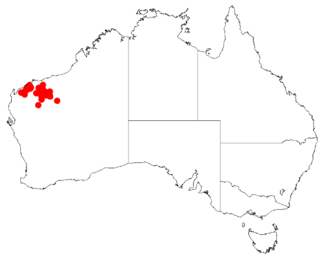
Acacia atkinsiana, commonly known as Atkin's wattle, is a shrub belonging to the genus Acacia and the subgenus Juliflorae endemic to Australia. The indigenous peoples of the area where the shrub is found, the Kurrama peoples, know the shrub as Bilari or Pilarri.
Acacia blaxellii, also known as Blaxell's wattle, is a shrub belonging to the genus Acacia and the subgenus Phyllodineae endemic to Western Australia.

Acacia rendlei is a shrub of the genus Acacia and the subgenus Phyllodineae that is endemic to south western Australia.

Acacia hadrophylla is a shrub of the genus Acacia and the subgenus Plurinerves that is endemic to south western Australia.

Acacia nivea is a shrub of the genus Acacia and the subgenus Plurinerves that is endemic to south western Australia.
Acacia pelophila is a shrub of the genus Acacia and the subgenus Plurinerves that is endemic to a small area along the west coast of western Australia.

Acacia sciophanes, commonly known as the Ghost wattle or Wundowlin wattle, is a shrub of the genus Acacia and the subgenus Plurinerves that is endemic to a small area in south western Australia. In 1995 it was declared as rare in 1995 according to the Western Australian Wildlife Conservation Act 1950 and is listed as endangered under the Environment Protection and Biodiversity Conservation Act 1999.

Acacia undosa is a shrub of the genus Acacia and the subgenus Plurinerves that is endemic to an area of south western Australia.

Acacia vittata, commonly known as Lake Logue wattle, is a shrub of the genus Acacia and the subgenus Plurinerves that is endemic to a small area in western Australia.
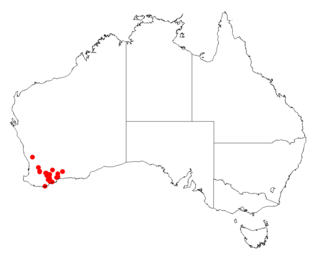
Acacia amputata is a shrub of the genus Acacia and the subgenus Pulchellae that is endemic to an area of south western Australia.
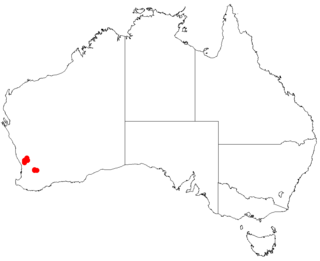
Acacia anarthros is a shrub of the genus Acacia and the subgenus Pulchellae that is endemic to an area of south western Australia.

Acacia depressa, also commonly known as echidna wattle, is a shrub of the genus Acacia and the subgenus Pulchellae that is endemic to south western Australia. It was listed as vulnerable according the Environment Protection and Biodiversity Conservation Act 1999 in 2007.

Acacia drewiana is a shrub of the genus Acacia and the subgenus Pulchellae that is endemic to an area of south western Australia.

Acacia epacantha is a shrub of the genus Acacia and the subgenus Pulchellae that is endemic to an area in the south west of Australia.

Acacia lateriticola is a shrub of the genus Acacia and the subgenus Pulchellae that is endemic to an area of south western Australia.
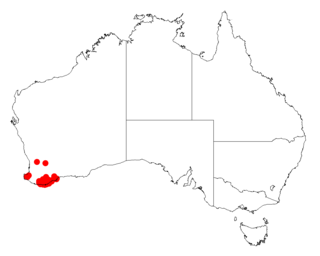
Acacia luteola is a shrub of the genus Acacia and the subgenus Pulchellae that is endemic to an area of south west Australia.

Acacia pentadenia, commonly known as karri wattle, is a shrub or tree of the genus Acacia and the subgenus Pulchellae.

Acacia preissiana is a shrub of the genus Acacia and the subgenus Pulchellae that is endemic to an area of south western Australia.
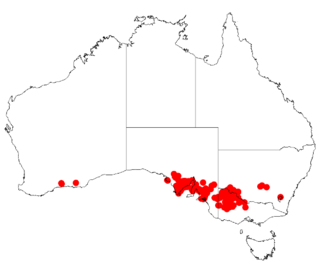
Acacia halliana is a shrub belonging to the genus Acacia and the subgenus Phyllodineae that is native to parts of south eastern Australia.

Acacia simmonsiana, commonly known as Simmons wattle or desert manna wattle, is a shrub belonging to the genus Acacia and the subgenus Phyllodineae native to south eastern Australia.




















